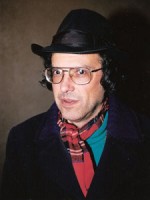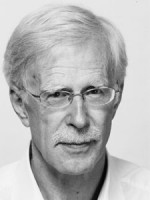Title
Every year, I intend to plan the coming New Juilliard Ensemble season early so my summer can be more relaxed, and every year I admire Mark Twain’s adage, “Never postpone until tomorrow what you can postpone until the day after tomorrow.” This year, rejoicing in the forthcoming book parties for Joseph Polisi’s biography of William Schuman and Jane Gottlieb’s book on research techniques, I could not ignore the shadow of Henry Cowell, whose complex biography has been overwhelming my desks and computers for nearly two decades. Unable to look myself in the mirror, I found myself postponing everything else in order to make progress with Henry. And now, the light is visible at the end of the tunnel.
Body
But postponement can only last so long. For much of the summer, I was going through piles of scores and recordings to design the main concert series of New Juilliard Ensemble, which opens on September 27 in the Peter Jay Sharp Theater. The amount of interesting-looking material that crosses my desk is really impressive. Too bad so much of it obeys another adage, “There is less than meets the eye.” I confess to losing my patience with certain styles that are considered cutting-edge in some quarters despite the passage of many decades in which that edge was worn to a frazzle. However, although there are many pieces that sound as if any one of hundreds of moderately talented composers could have written them, one must be open-minded. Every now and then, someone has a really fresh view of a seemingly stale idea. And then there are the new ideas! I always end up with far more pieces that I would love to conduct than I can fit into the concerts.
This year’s season again has a wealth of variety. It also will propel N.J.E. closer to having given 100 world premieres in a decade and a half. It is especially gratifying to premiere a superb piece by a composer no one knows. On this season’s opening program, that place is taken by the distinguished Bulgarian composer Roumen Balyozov, who gave me some scores when we met in Sofia a few years ago. (I don’t think I have ever returned from a trip without new scores and CDs.) His string quartet impressed me so much that I included it in the Museum of Modern Art’s Summergarden series last year, where it was well received. Feeling extremely grateful for a prominent American performance, Balyozov spontaneously wrote a piece for N.J.E., called Juilliard Concerto. It promises to be an exciting display piece for the ensemble.
At another festival in the late 1980s, I had the pleasure of meeting the English composer Jonathan Harvey, who at that time was pursuing the predominant serious, dissonant modernist style. Therefore, when I received his 2007 Sprechgesang for oboe/English horn and chamber orchestra, I could scarcely believe my ears. It is an amazingly witty transplantation of human speech to solo oboe and ensemble. The group is “discussing” heaven-knows-what, but something very strange. But before deciding to program it, I needed to be sure that someone was willing to tackle the extended techniques. Oboist Toni Marie Marchioni, returning to Juilliard to enter the D.M.A. program, did not hesitate for a second.
Also in my giant pile was Frederic Rzewski’s Bring Them Home!, for two pianos, two percussionists, and ensemble. When I first knew him in the late 1950s—I was an undergraduate and he was a graduate student—political and social activism were already central to his personality, and his compositions projected his beliefs. Fortunately, his imagination and compositional skill are so strong that they prevented his music from becoming dated, a frequent fate of politicized music. His piano solo The People United Will Never Be Defeated has become a major part of the repertory, and I have enjoyed repeatedly performing the two-piano version of Winnsboro Cotton Mill Blues, a protest against labor exploitation. But when I saw him at a German festival in 1988, our first encounter in 27 years, I was shocked to see him in a suit and tie. I asked in astonishment, “Frederic, what has happened to you?” He assured me that he was still himself, and Bring Them Home! (2004) proves the point.
Poly (2007) was given to me by the young Hungarian composer Balazs Horvath, who was the Liszt Academy faculty member in charge of last year’s collaboration between Juilliard and the Academy. Quite new at that point, the work had just won a European competition for a memorial piece honoring Gyorgy Ligeti. Poly was a departure for Horvath, and a fascinating one: a kind of fantasy on Ligeti. It went to the top of the pile for later consideration. (A beloved cousin used to say that he had a big bowl in which he put all the bills that needed to be paid, but if his creditors weren’t nice, they did not even get to go into the bowl!)
Last, but definitely not least, is Icerapp (Icelandic Rap) (1987), for an ensemble that plays and sings, by Iceland’s best known composer, Atli Heimir Sveinsson. I won’t say a word—it definitely has to be heard to be believed. It will ensure that the opening concert is packed with energy. With luck, the new grand entrance to the Peter Jay Sharp Theater may be open just in the nick of time.
A word in retrospect: As of the writing of this article, the N.J.E. performers at Summergarden, presenting 16 New York, Western Hemisphere, or world premieres, enjoyed two concerts in excellent weather with audiences of about 750 each. The opening concert, moved indoors because of threatening weather, had the maximum audience of 350, with 200 turned away. (Of course, it never rained.) We are hoping for a fine evening for the conclusion, on August 17. It certainly seems that there is an audience for new music.








